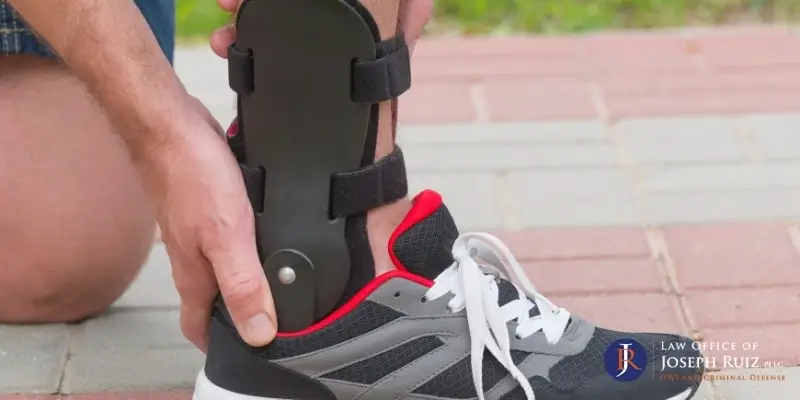|
|
Last Modified on Dec 17, 2025
Ankle monitors in Texas can be ordered for various criminal charges, serving as a condition of pretrial release, probation, or parole. Factors judges consider include offense circumstances, criminal history, community ties, and past violations. Violating ankle monitor rules can lead to arrest, bond revocation, or new charges. As of an unspecified recent year, approximately 2,800 out of 75,000 people on parole supervision in Texas were on traditional electronic monitoring.
In Texas, certain criminal charges can come with being ordered to wear an ankle monitor. You may wonder, which crimes can lead to wearing an ankle monitor in Texas? The answer depends on the nature of the offense, court decisions, and individual circumstances. Understanding when and why these devices are used can help you better anticipate potential outcomes and prepare for the restrictions that might accompany specific charges.
Hire a Criminal Defense Lawyer
Joseph Ruiz is a Texas trial lawyer with significant experience in criminal defense work, including cases where conditions of electronic monitoring may be imposed as a condition of community supervision.
In addition to having tried more than 350 jury trials, he has been named a Super Lawyer, as well as to The National Trial Lawyers Top 100 and Martindale-Hubbell’s Client Champion Silver Award.
Mr. Ruiz is also a member of the Texas Bar College. This system enables him to stay current with the ever-changing statutes and sentencing guidelines, thereby assisting his clients in making informed decisions about ankle monitors and other punishments.
How Ankle Monitors Are Used in Texas Criminal Cases
In Texas, ankle monitors, also referred to as electronic monitoring devices, serve a significant role in tracking a defendant’s movements and ensuring compliance with court-ordered restrictions. Depending on the type of ankle monitor, it can be used to verify a defendant’s location through GPS tracking, enforce curfews via radio frequency signals, or monitor alcohol consumption through Secure Continuous Remote Alcohol Monitoring (SCRAM) technology.
Judges may impose ankle monitors as a condition of pretrial release, probation, or parole when they determine that additional supervision is warranted. By allowing defendants to remain in the community under strict monitoring, ankle monitors offer an alternative to incarceration while their case is pending or their sentence is being served.
Common Offenses That May Result in Electronic Monitoring
Ankle monitors in Texas allow law enforcement to track the defendant’s location in real-time, electronically enforce a curfew, or even detect the presence of alcohol in a defendant’s system with SCRAM technology. In Texas, judges can order electronic ankle monitors as a condition of pretrial release, probation, or parole, to ensure that defendants are following the orders of the court.
The Texas Department of Criminal Justice indicates that out of the 75,000 people on parole supervision in Texas, there are approximately 2,800 currently on traditional electronic monitoring devices. These devices have made it possible for some defendants to serve their time under supervision within the community rather than in custody.
Factors Judges Consider When Ordering an Ankle Monitor
Judges in Texas take several factors into consideration before they order an ankle monitor. The circumstances of the offense, the defendant’s criminal history, ties to the community, and past bond/probation/parole violations are all taken into consideration. The court may also want to know if the accused is dangerous to others or is likely to flee before trial.
In certain circumstances, a court may view an ankle monitor as a compromise between full incarceration and standard release on personal recognizance. An ankle monitor generally represents a higher level of supervision without total incarceration.
Potential Consequences of Violating Ankle Monitor Rules
Failing to comply with ankle monitor conditions in Texas can have serious consequences. Violations can be as simple as tampering with the device, traveling to a prohibited location, missing curfew, or using a prohibited substance.
Supervising officers are required to report any violations to the court or probation department, and you can face arrest, bond revocation, or additional criminal charges. Violations of probation or parole can lead to longer monitoring terms and possible jail time.
Even small violations can damage the court’s confidence in your ability to comply with the program, which could make it more difficult to be granted leniency in the future. It’s important to follow the rules of your monitoring program closely to keep your release and avoid more serious consequences.
FAQs
Can You Be Ordered to Wear an Ankle Monitor Before Trial in Texas?
Yes, you can be ordered to wear an ankle monitor in Texas before trial. Judges may require electronic monitoring as a condition of bond if they believe it’s necessary to ensure that you follow travel restrictions, curfews, or no-contact orders. This often happens in domestic violence cases, repeat DWI offenses, or serious felony charges. The judge can consider factors like public safety, risk of flight, and the nature of your charges when making this decision.
Do All Probation Sentences in Texas Require an Ankle Monitor?
Not everyone in Texas on probation gets an ankle monitor. It depends on the circumstances surrounding your offense, your criminal history, and the conditions of your probation dictated by the judge or probation department. Ankle monitors are more likely to be used for high-risk probationers or those who have specific restrictions, such as curfew or exclusion zones that can be enforced with GPS tracking.
Can an Ankle Monitor Detect Alcohol Use?
Yes, some ankle monitors are alcohol-detecting. If you’re wearing a SCRAM bracelet, the alcohol level in your perspiration is monitored. The data is transmitted to your supervising agency. Judges can order SCRAM monitors for DWI cases, particularly with multiple offenses or in cases where a defendant has been ordered to refrain from alcohol use.
Violations like drinking with a SCRAM monitor can lead to the bond being revoked, violation of probation, or other penalties.
What Happens if You Tamper With an Ankle Monitor in Texas?
Tampering with an ankle monitor in Texas can lead to serious legal consequences. Tampering can involve cutting the strap, removing the device, or disabling its signal. This can lead to immediate arrest, bond revocation, probation termination, or new criminal charges. In Texas, tampering is a separate offense, leading to additional jail time or fines on top of the original sentence.
Contact The Law Office of Joseph Ruiz, PLLC
If you are being charged with an offense that may result in an ankle monitor in Texas, it is critical to have an experienced attorney on your side. The Law Office of Joseph Ruiz, PLLC, can help you to uphold your rights and avoid unnecessary and overly burdensome restrictions. Call to schedule your private consultation.







